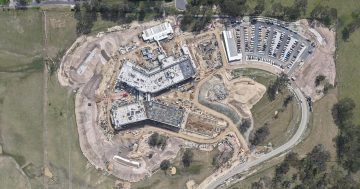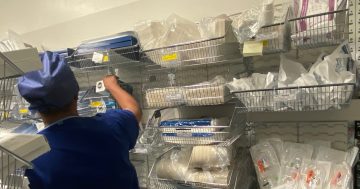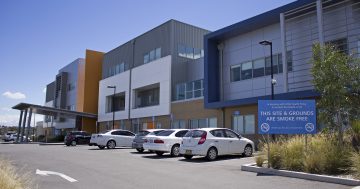
New commonwealth funding though the NSW Primary Health Network aims to help patients streamline their medications and reduce errors in drug usage and dosages. Photo: Pharmacy Facebook.
Regional medical practices have been awarded Commonwealth funding to integrate a non-dispensing pharmacist into their care teams, with the aim of providing medication-related advice to patients.
Main Street Medical Practice in Merimbula, Queanbeyan GP Super Clinic and Queen Street Medical Centre in Moruya and Broulee have all employed local pharmacists to be on hand in their practice on a part-time basis to review patients medications and ensure that the medication is still relevant and dosages are appropriate.
Dianne Kitcher, CEO of South Eastern NSW Primary Health Network, says this funding is an extension of the Patient-Centred Medical Home (PCMH) innovation project, which saw a consultant pharmacist successfully integrated within a general practice during a trial in 2018.
“All local health care providers were invited to submit an expression of interest to participate in this round of funding, and we congratulate the four successful applicants.”
The fourth successful applicant was Woonona, in the Illawarra.
Primary Health Networks were established by the Department of Health in 2015 with the objective of increasing the efficiency and effectiveness of medical services for patients, particularly those at risk of poor health outcomes and Ms Kitcher expects that the investment of on-site pharmacists has the potential to result in significant savings to the health care system.
Main Street Medical Centre will engage a pharmacist one day per week to work with doctors to identify patients with multiple, unnecessary or dated medications.
“The pharmacist will also support the medication of patients discharged from hospital and will review patients’ prescribed controlled drugs, including consideration of alternative medicines,” Ms Kitcher explains.
Meanwhile, the Queanbeyan GP Super Clinic will work with a pharmacist on projects to improve the way patients manage their medications.
“The practice will focus on patients who have recently been discharged from the hospital in an attempt to avoid re-admission due to medication issues. They will also work with patients who identify as Aboriginal and Torres Strait Islander and older patients on their medicine compliance, with the aim of improving their health outcomes,” Ms Kitcher says.
Queen Street Medical Centre will engage a pharmacist to work closely with their doctors across their medical practices in Moruya and Broulee.
They will hold ‘better medicines’ clinics with their patients to improve their use of medicines, with a particular focus on patients who are already relying on clinics to support their conditions.
The pharmacist will also train the doctors and nursing staff on the quality use of medicines as well as supporting hospital discharge summaries.
Finally, they will work closely with residential aged care facilities in the area to identify and prevent a range of medication-related problems, ultimately translating into improved health outcomes and reduced hospitalisations.
According to Ms Kitcher, integrating pharmacists into the general practice setting will help strengthen their capacity to offer more comprehensive care.
“Patients will benefit by having an improved understanding of the medicines they are taking, why they are taking them, and how best to take them, and doctors will benefit by gaining access to accurate and up-to-date information about their patients’ medications, including data about compliance and possible interactions.”
Ms Kitcher added that the Primary Health Network will continue to support general practices not involved in this part of the project through various quality activities aimed at supporting vulnerable patients, reducing potentially preventable hospitalisations, improving population health, reducing health care costs and fostering greater satisfaction of health providers.
This project is supported by funding from the Australian Government through the Primary Health Network Program.











